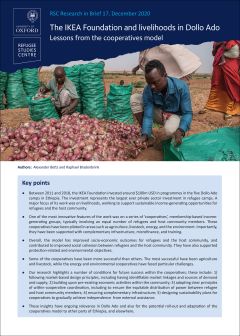The IKEA Foundation and livelihoods in Dollo Ado: lessons from the cooperatives model
Alexander Betts , Raphael Bradenbrink

Between 2011 and 2018, the IKEA Foundation invested around $100m USD in supporting infrastructure and livelihoods programmes in, and around, the remote Dollo Ado refugee camps in the Somali region of Ethiopia. It worked collaboratively with UNHCR and the Ethiopian Government. One of the most innovative features was a series of ‘cooperatives’, membership-based income-generating groups, typically involving an equal number of refugees and host community members. These cooperatives have been piloted in areas such as agriculture, livestock, energy, and the environment. Importantly, they have been supported with complementary infrastructure, microfinance, and training. Between June and December 2019, the RSC’s Refugee Economies Programme undertook a retrospective evaluation of the impact of the interventions. Using a mixed-methods approach to gather extensive quantitative and qualitative data, the aim of the evaluation was to inform better future programming in Dollo Ado, throughout Ethiopia, and globally. Overall, the cooperatives model has improved socio-economic outcomes for refugees and the host community, and contributed to improved social cohesion between refugees and the host community. It has also supported protection-related and environmental objectives. Some of the cooperatives have been more successful than others, the most successful being agriculture and livestock, while the energy and environmental cooperatives faced particular challenges. Our research highlights a number of conditions for future success within the cooperatives.
